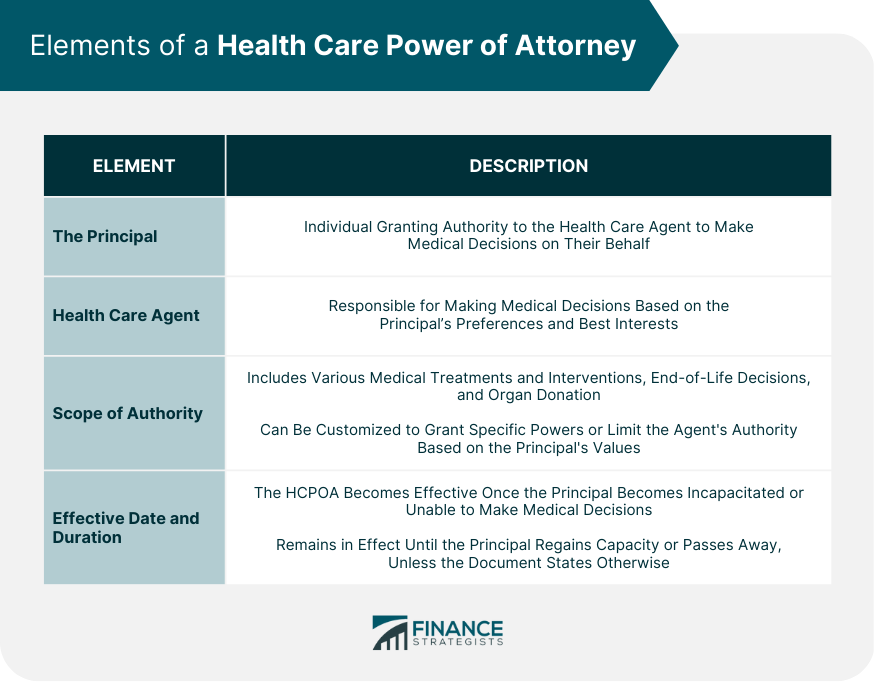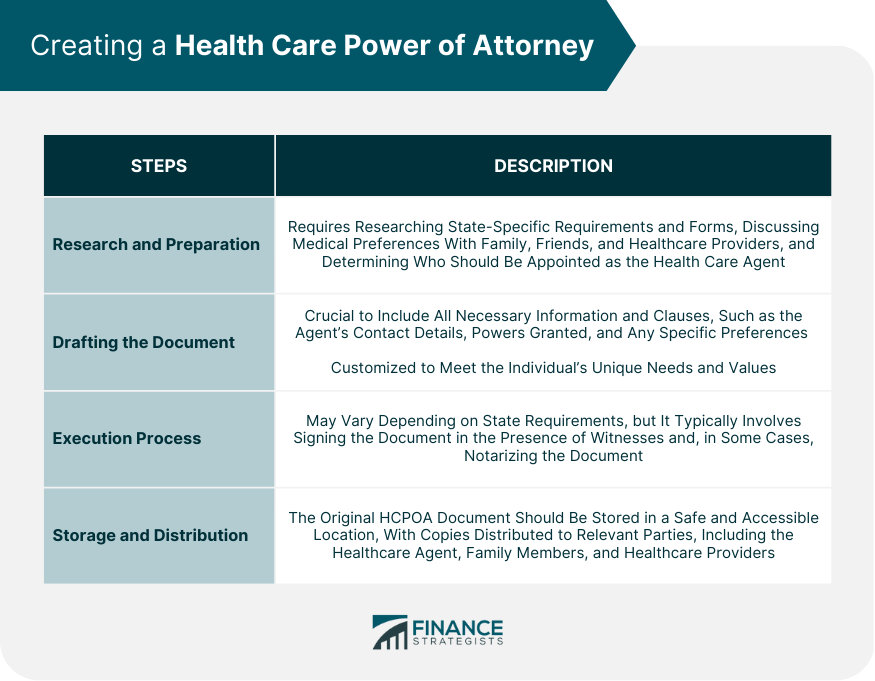What Is a Health Care Power of Attorney?
A Health Care Power of Attorney (HCPOA) is a legal document that allows an individual (the principal) to appoint a trusted person (the agent or proxy) to make medical decisions on their behalf when they become incapacitated or unable to communicate their preferences.
The document is essential for ensuring that the principal's medical care aligns with their values and wishes.
Having an HCPOA in place is crucial for several reasons, including giving the principal control over their medical treatment, reducing the burden on family members during difficult times, and providing clear guidance to healthcare professionals.
A well-crafted HCPOA can prevent conflicts and confusion that might arise when individuals are faced with making critical healthcare decisions. The HCPOA is one of several advance directives, including Living Wills and Durable Powers of Attorney.
While each document serves a different purpose, they all play a vital role in ensuring that an individual's medical care preferences are respected and followed when they are unable to express them personally.
Elements of a Health Care Power of Attorney
The Principal
The principal is the individual granting authority to the health care agent to make medical decisions on their behalf. The principal must be of sound mind and legal age when signing the HCPOA.
Health Care Agent: Role and Responsibilities
The health care agent, also known as a proxy or surrogate, is responsible for making medical decisions based on the principal's preferences and best interests.
The agent must be a competent adult who is willing and able to assume this role. Responsibilities include interpreting the HCPOA document, communicating with healthcare providers, and making decisions that align with the principal's wishes.
Scope of Authority
The scope of authority granted to the health care agent in the HCPOA can include various medical treatments and interventions, end-of-life decisions, and organ donation and autopsy preferences.
The principal can customize the document to grant specific powers or limit the agent's authority based on their values and beliefs.
Effective Date and Duration
The HCPOA becomes effective once the principal becomes incapacitated or unable to make medical decisions. It remains in effect until the principal regains capacity or passes away, unless the document states otherwise.
The principal can also revoke or amend the document at any time, provided they are of sound mind.

Creating a Health Care Power of Attorney
Research and Preparation
Creating an HCPOA requires researching state-specific requirements and forms, discussing medical preferences with family, friends, and healthcare providers, and determining who should be appointed as the health care agent.
Drafting the Document
When drafting the HCPOA, it is crucial to include all necessary information and clauses, such as the agent's contact details, powers granted, and any specific preferences. The document should be customized to meet the individual's unique needs and values.
Execution Process
The execution process may vary depending on state requirements, but it typically involves signing the document in the presence of witnesses and, in some cases, notarizing the document.
Storage and Distribution
The original HCPOA document should be stored in a safe and accessible location, with copies distributed to relevant parties, including the healthcare agent, family members, and healthcare providers.

Legal and Ethical Considerations
Protecting the Principal's Autonomy and Wishes
An HCPOA should prioritize the principal's autonomy and wishes, ensuring that the agent acts according to the principal's preferences and best interests.
Balancing the Needs of the Principal and the Agent
The HCPOA should balance the needs of the principal with the agent's responsibilities and decision-making authority, providing the agent with enough guidance to fulfill their role effectively.
Navigating Conflicts of Interest and Family Dynamics
The HCPOA should address potential conflicts of interest and family dynamics that may arise during the decision-making process.
Open communication and transparency between the principal, the agent, and other family members can help mitigate potential disagreements and ensure that the principal's preferences are respected.
Conclusion
The Value of a Well-Crafted Health Care Power of Attorney
Having a well-crafted HCPOA in place is essential for ensuring that an individual's medical care preferences are respected and followed when they are unable to express them personally.
The document can provide peace of mind for both the principal and their loved ones, knowing that there is a plan in place for future medical care.
Encouraging Proactive Planning for Future Medical Care
Creating and maintaining an HCPOA encourages proactive planning for future medical care, empowering individuals to take control of their healthcare decisions and providing guidance to healthcare providers and family members when critical decisions must be made.
Continual Review and Updating of HCPOA Documents
As an individual's medical preferences and personal values may change over time, it is essential to review and update the HCPOA regularly.
This ensures that the document remains current and accurately reflects the principal's wishes, providing the health care agent with the most up-to-date guidance when making decisions on the principal's behalf.
Health Care Power of Attorney FAQs
A health care power of attorney is a legal document that allows you to appoint someone to make health care decisions for you if you become unable to make them yourself. This person, known as your agent or surrogate, is authorized to make decisions about your medical treatment and care, including decisions about life-sustaining treatments.
You should choose someone you trust, who knows you well, and who is willing to make difficult decisions on your behalf. This person should also be able to communicate effectively with your health care providers and other family members. It's important to discuss your wishes and preferences with your agent beforehand so they can make informed decisions on your behalf.
No, you don't necessarily need a lawyer to create a health care power of attorney, although it is recommended. Many states provide free or low-cost forms that you can use to create a health care power of attorney. However, it's important to ensure that your document meets your state's requirements and that it accurately reflects your wishes.
Yes, you can revoke a health care power of attorney at any time, as long as you are still capable of making decisions. You should inform your agent and any health care providers who have a copy of the document that it has been revoked. If you become incapacitated, your agent's authority will continue until a court determines that you are no longer incapacitated or until you appoint a new agent.
A health care power of attorney becomes effective when you become incapacitated and are no longer able to make your own health care decisions. It's important to note that a health care power of attorney does not give your agent the authority to make decisions while you are still capable of making them yourself.
True Tamplin is a published author, public speaker, CEO of UpDigital, and founder of Finance Strategists.
True is a Certified Educator in Personal Finance (CEPF®), author of The Handy Financial Ratios Guide, a member of the Society for Advancing Business Editing and Writing, contributes to his financial education site, Finance Strategists, and has spoken to various financial communities such as the CFA Institute, as well as university students like his Alma mater, Biola University, where he received a bachelor of science in business and data analytics.
To learn more about True, visit his personal website or view his author profiles on Amazon, Nasdaq and Forbes.











